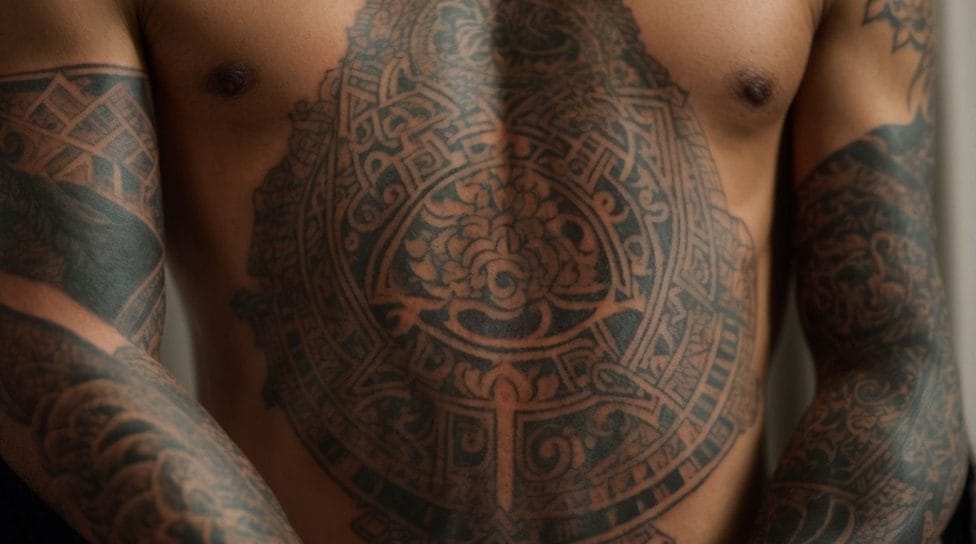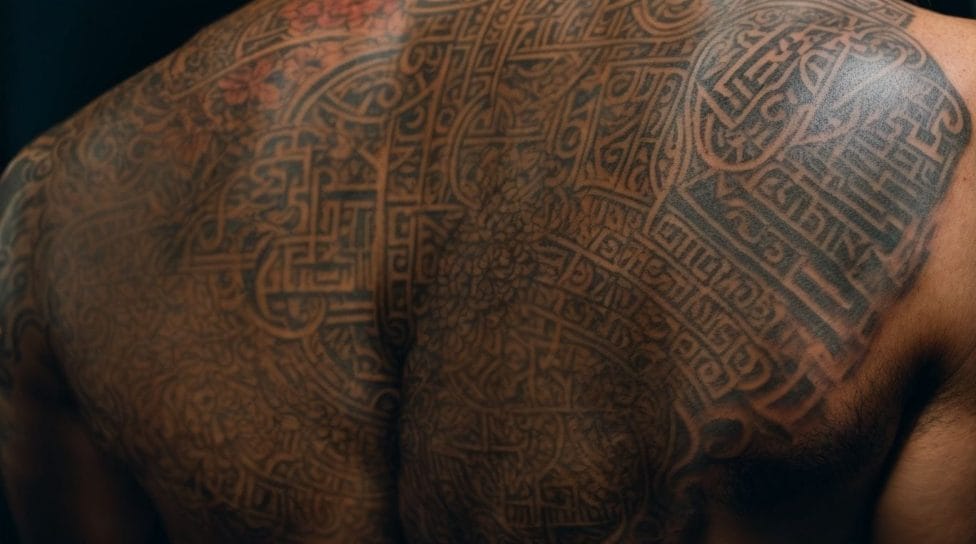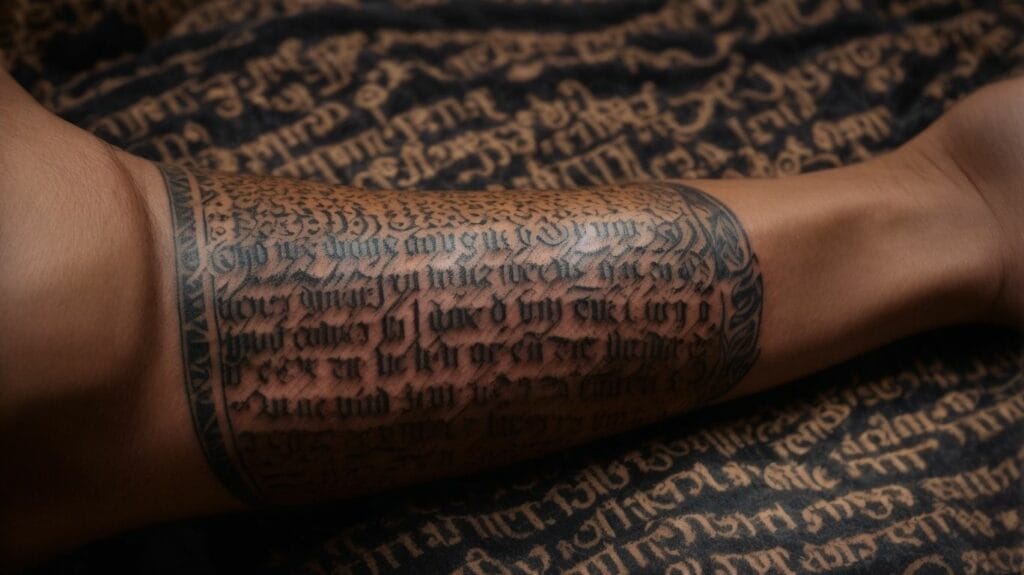Tattoos have a rich historical and cultural background, with origins dating back thousands of years. Understanding the perspectives on tattoos within the context of the Bible and Christianity is a topic of interest for many individuals.
Examining the historical and cultural background of tattoos provides insights into their origins and their significance across different cultures. Exploring relevant biblical scriptures and interpreting them can shed light on what the Bible says about tattoos. It is important to consider the different perspectives on tattoos within Christianity, both traditional and modern.
The traditional Christian view on tattoos often leans towards discouragement, citing biblical verses that caution against marking the body. However, modern Christian views on tattoos are more varied, with some embracing tattoos as a form of self-expression or even as a way to share their faith.
When considering getting a tattoo, there are several factors that Christians may take into account. Personal convictions and freedom play a role, as individuals may have different interpretations of biblical teachings. Respecting cultural and social norms is also an important consideration, as tattoos may carry different meanings and implications in different contexts.
By delving into the historical, biblical, and Christian perspectives on tattoos, individuals can gain a comprehensive understanding of this topic and make informed decisions based on their personal beliefs and convictions.
Key takeaways:
- Tattoos in different cultures: Tattoos have been present in various cultures throughout history, each with its meanings and significance.
- What the Bible says about tattoos: The Bible does mention tattoos in a specific context, but interpretations on whether it is permissible or not can vary among Christians.
- Considerations for Christians: When deciding whether to get a tattoo, Christians should consider personal convictions, respect cultural and social norms, and seek guidance from their religious community.
Historical and Cultural Background of Tattoos

Photo Credits: Tattooineplanet.Com by Eugene Flores
Tattoos have a rich and diverse history that reflects both individual expression and cultural significance. In this section, we’ll dive into the fascinating origins of tattoos and explore their profound presence in different cultures around the world. From ancient tribal practices to modern interpretations, we’ll uncover the captivating stories behind this age-old art form. So, get ready to embark on a journey through time and explore the historical and cultural background of tattoos.
Origins of Tattoos
The origins of tattoos can be traced back thousands of years. They have been found on mummies in ancient Egypt, dating as far back as 3300 BCE. In Polynesia, tattooing has a rich cultural history and serves as a symbol of identity and status. Native Americans used tattoos for spiritual and healing purposes. In Japan, tattoos have deep roots in their traditional art form called irezumi. These ancient practices have influenced modern tattooing styles and techniques around the world. Exploring the origins of tattoos provides insight into the cultural significance and evolution of this ancient form of body art.
Tattoos in Different Cultures
In different cultures, tattoos carry various meanings and significance, including the rich diversity of tattoo traditions across different cultures. For example, in Maori culture, facial tattoos called “moko” represent a person’s identity, social status, and tribal affiliations. Similarly, traditional Japanese tattoos, known as “irezumi,” are often seen as a symbol of strength, bravery, and devotion to one’s beliefs. Polynesian cultures utilize intricate designs and symbols in their tattoos to convey cultural heritage, family connections, and personal achievements. Moreover, Native American tribes also embrace tattoos to signify spiritual beliefs, tribal affiliations, and personal achievements. Thus, tattoos in different cultures reflect the unique values and customs of each society.
Understanding What the Bible Says about Tattoos

Photo Credits: Tattooineplanet.Com by Dennis Brown
Are you curious about tattoos and what the Bible has to say about them? Dive into the fascinating world of understanding what the Bible says about tattoos. We’ll explore relevant biblical scriptures and how they are interpreted, shedding light on the ancient perspectives that shape this ongoing discussion. Get ready to uncover the insights and wisdom behind this timeless debate.
Relevant Biblical Scriptures
Relevant Biblical Scriptures play a pivotal role in comprehending the perspectives on tattoos within Christianity. These verses encompass Leviticus 19:28, which explicitly states, “You shall not make any cuts on your body for the dead or tattoo yourselves.” Another scripture of great significance is found in 1 Corinthians 6:19-20, which emphasizes the sacredness of the body as a temple of the Holy Spirit. While interpreting these verses, there may be divergent views, with some considering tattoos as a transgression while others focus on contextual and cultural relevance. When contemplating getting a tattoo, Christians should carefully consider their personal beliefs, uphold cultural norms, and delve into the historical and cultural background of tattoos. A thorough understanding of the biblical foundation serves as a vital component for making well-informed decisions.
Tattoos have served as a powerful means of self-expression across various cultures for centuries. Ancient Egypt, for instance, regarded tattoos as symbols of prestige and beauty. Indigenous communities worldwide have employed tattoos for cultural and spiritual purposes. In Polynesia, elaborate tattoos known as tatau are utilized to narrate stories and commemorate significant milestones. In modern times, tattoos have become immensely popular as a form of art and personal expression. Today, tattoos are acclaimed for their artistic value and hold diverse meanings for individuals hailing from different backgrounds.
Interpreting the Scriptures
Understanding and interpreting the Scriptures is essential when discussing the religious viewpoint on tattoos. Various biblical passages have been mentioned to offer guidance on this matter. One particularly relevant verse is Leviticus 19:28, which declares, “You shall not make any cuts on your body for the dead or tattoo yourselves: I am the Lord.” Properly interpreting this verse necessitates examining the historical context and considering the intended audience. Some individuals argue that this commandment was specific to ancient Israel and aimed at setting them apart from the cultures around them. On the other hand, some believe that it still holds today, viewing tattoos as a violation of the body, which is considered to be God’s temple. Therefore, a thorough understanding of the Scriptures is crucial in shaping one’s beliefs regarding tattoos within the Christian faith.
The Different Perspectives on Tattoos within Christianity

Photo Credits: Tattooineplanet.Com by Albert Campbell
When it comes to tattoos within Christianity, there are a variety of perspectives that exist. From the traditional Christian view to more modern interpretations, the discussion surrounding tattoos is rich and diverse. In this section, we’ll delve into the contrasting viewpoints and explore how these perspectives shape the understanding of tattoos within the Christian faith. Buckle up because we’re about to unravel the tapestry of beliefs and explore the different paths Christians walk when it comes to body art.
Traditional Christian View on Tattoos
The interpretation of specific biblical scriptures forms the foundation of the traditional Christian view on tattoos. According to Leviticus 19:28, tattoos are seen as a defilement of the body, which is considered a sacred temple. This belief underscores the significance of upholding purity and refraining from worldly customs. It is important to recognize that opinions on tattoos among Christians can vary depending on individuals and denominations. Therefore, Christians contemplating getting a tattoo should earnestly contemplate their convictions and show reverence for the cultural and social norms within their faith community.
Modern Christian Views on Tattoos
- Modern Christian Views on Tattoos vary, with some embracing them as a form of personal expression and others regarding them as inappropriate. Here are a few key perspectives:
- Acceptance: Many modern Christian denominations view tattoos as a personal choice and emphasize the importance of inner character over outward appearance.
- Caution: Some Christians believe that tattoos may be associated with negative connotations, such as rebellion or excessive focus on self-image.
- Context: The cultural and historical context of tattoos is taken into consideration, with some Christians supporting tattoos that carry cultural or spiritual significance.
- Discernment: Christians are encouraged to prayerfully consider their motivations and intentions for getting a tattoo, weighing factors such as humility, modesty, and honoring God.
Considerations for Christians Regarding Tattoos

Photo Credits: Tattooineplanet.Com by Alan Johnson
I’m considering getting a tattoo, but wondering what the Bible says? In this section, we’ll explore some important considerations for Christians regarding tattoos. We’ll dive into personal convictions and freedom, examining how individuals navigate this topic within their faith. We’ll discuss the significance of respecting cultural and social norms when it comes to tattoos. So, let’s delve into this intriguing subject and shed light on the diverse perspectives surrounding tattoos in the Christian community.
Personal Convictions and Freedom
When it comes to tattoos, personal convictions, and freedom play a significant role in decision-making. Individuals should consider their own beliefs, values, and comfort levels before getting a tattoo. Some may view tattoos as a form of personal expression and embrace the freedom to adorn their bodies with meaningful artwork. Others may have religious or cultural beliefs that discourage or prohibit tattoos. It’s important for individuals to reflect on their convictions and respect the choices of others, recognizing that personal freedom varies from person to person.
Throughout history, people have used tattoos to express their individuality and cultural identities. Ancient civilizations like the Egyptians, Maoris, and Polynesians considered tattoos a symbol of status, spirituality, or tribal affiliation. In modern times, tattoos have become a mainstream form of self-expression, allowing individuals to commemorate loved ones, share meaningful quotes or symbols, or showcase their unique style. The history of tattoos reflects the evolving perspectives on personal convictions and freedom, highlighting the diverse ways in which people express themselves through body art. For more information on what the Bible says about tattoos, you can visit.
Respecting Cultural and Social Norms
Respecting cultural and social norms is of utmost importance when it comes to getting a tattoo, particularly for Christians. It is essential to have a clear understanding of the cultural significance and potential impact that tattoos can have on different societies. While some cultures may embrace tattoos as a means of artistic expression, others perceive them as taboo or inappropriate. As Christians, it is crucial to honor and comply with these norms, making sure that our choices are in line with our personal beliefs and the values of the communities we are a part of. By doing so, we can effectively navigate the complexities of tattoo acceptance within diverse cultural and social contexts.
Some Facts About “Tattoos: What the Bible Says?”
- ✅ The Bible does not specifically mention tattoos. (Source: Bible Study Tools)
- ✅ Despite the lack of clear prohibition, Leviticus 19:28 is often cited as a verse that addresses tattoos. (Source: Bible Study Tools)
- ✅ The exact meaning of the word “tattoo” in Leviticus is uncertain since it did not exist in English until the late 1700s. (Source: Bible Study Tools)
- ✅ The prohibition in Leviticus against markings on the body likely refers to scarification practices in Egypt and Canaan, not modern tattooing. (Source: Bible Study Tools)
- ✅ While there may be no clear biblical stance on tattoos, Christians are encouraged to seek guidance from the Holy Spirit and consider the purpose and glorification of God in one’s body. (Source: Bible Study Tools)


